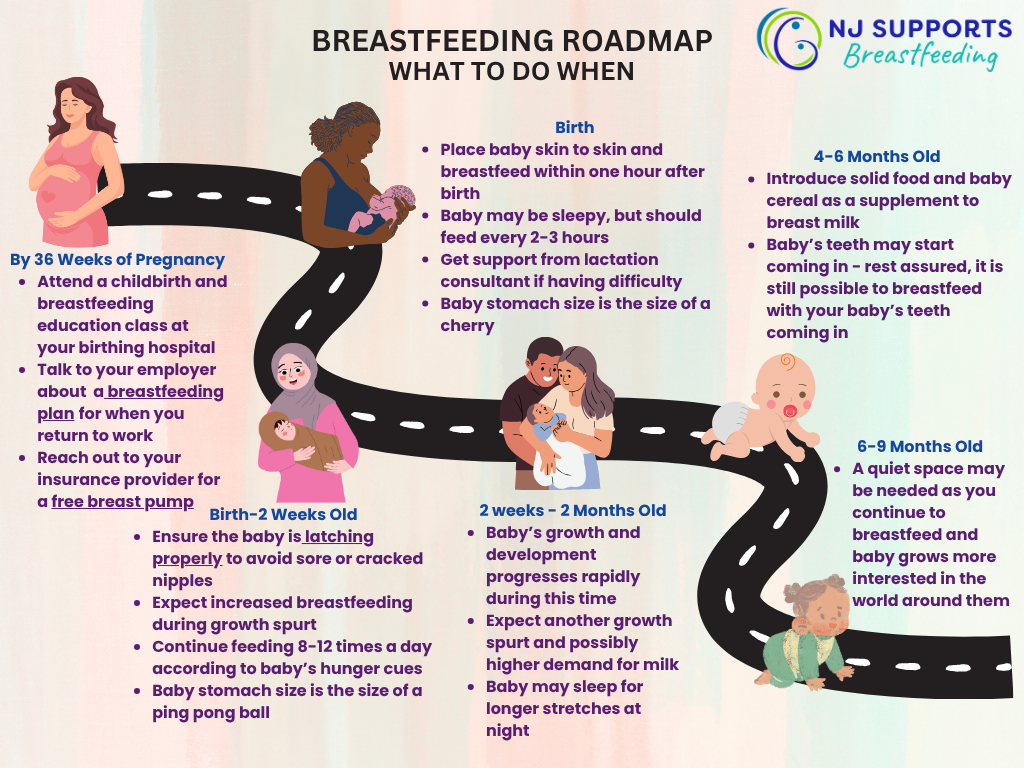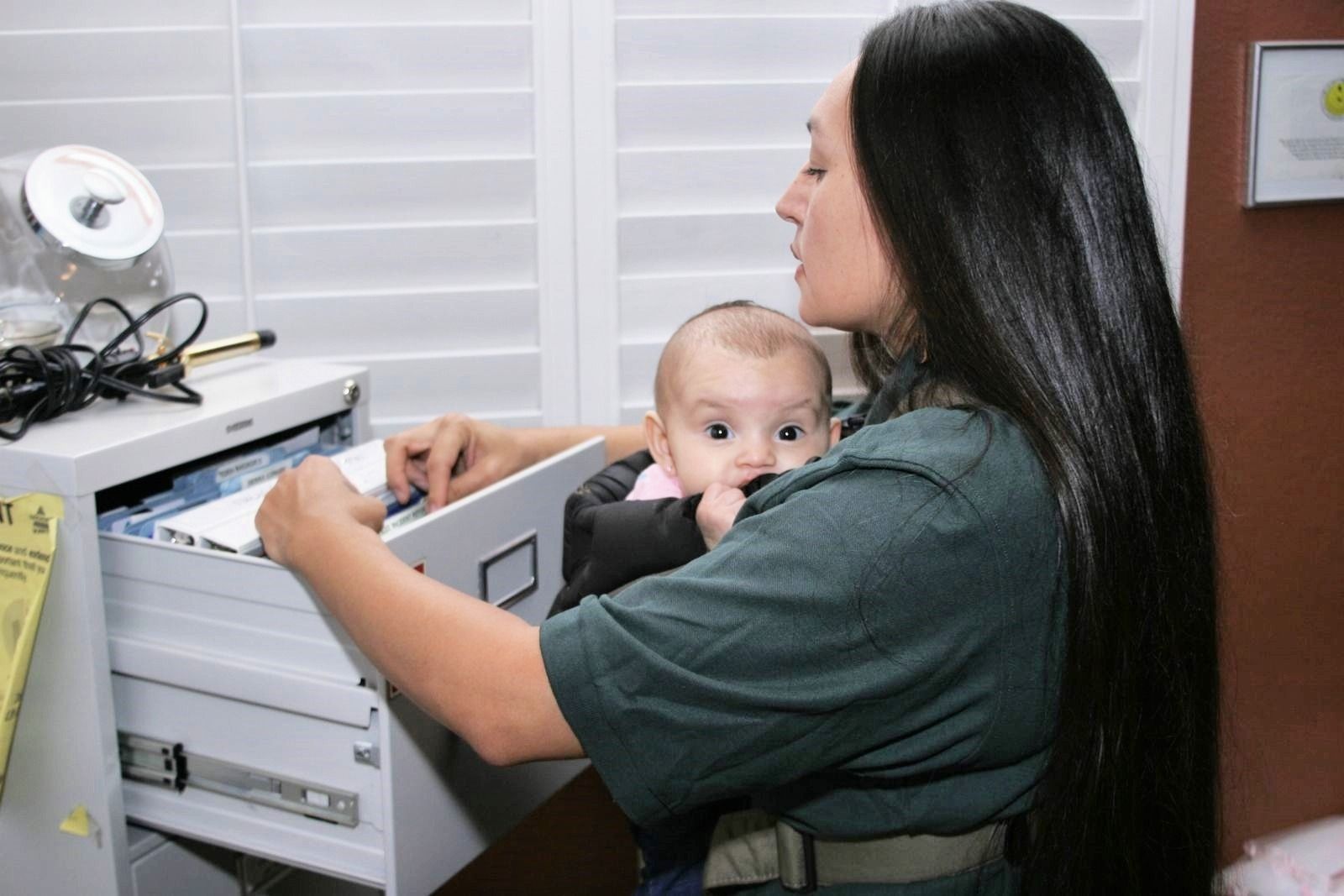Preparing Yourself
Breastfeeding is a powerful act of nourishment and bonding. But for many, the journey is far from easy. Systemic barriers, lack of support, historical trauma, lack of culturally competent care, and social pressure, can all get in the way of a successful experience. Black women face these challenges more often than other races and ethnicities which leads to lower rates of breastfeeding initiation and continuation. Information and advocacy are power. Know your facts and advocate for yourself to make your infant feeding choices heard.
Even before taking that first pregnancy test, you may experience changes to your breasts. You may experience tenderness and tingling and a darkening of the areola (the area around the nipple). No special breast preparation is required. Your body prepares itself for breastfeeding while you are pregnant and has started to make milk by the second trimester which will be available when the baby is born. Your breasts and nipples may have grown larger and darker, and you may have seen some wet or dried clear or yellowish colostrum (the first milk) on your nipples during your pregnancy. Those are good signs that you will be ready to feed your baby after the birth!
During the third trimester, you can contact your insurance or Medicaid provider to request a breast pump at no cost to you. Direct feeding is best for you and your baby, but if that is not possible, a breast pump will be necessary to remove milk from your breasts. A breast pump is also necessary to express milk to maintain your supply if you must be separated from the baby for long periods of time or need to return to work or school. For more information on obtaining a pump, selecting a pump, and how to use it, visit our When You Need to Pump section. For information on pumping and returning to work or school, visit our Back to Work section.
Here are some ways you can learn about breastfeeding and get off to a good start:
- Take a prenatal breastfeeding class. Breastfeeding classes offer you and your partner the ability to prepare and ask questions prior to baby’s arrival. Classes are offered through hospitals, birth centers, and breastfeeding support programs and are available in-person and virtually. Visit our Get Help page to find a class.
- Watch videos, read books/handouts, or visit our Beginning Breastfeeding page.
- Speak with experienced parents and lactation specialists. There are lactation consultants and support groups nearby that can offer guidance both before and after giving birth, through home or office visits, meetings or by virtual consultations.

- Schedule a prenatal lactation consultation to help prepare you and to learn what to expect after the baby is born.
- Schedule a tour of the hospital or birth center where you plan to give birth and ask about the lactation support you can expect in the hospital. New Jersey has many baby-friendly hospitals to choose from.
- Create a birth and breastfeeding plan and include practices that support breastfeeding including skin-to-skin care, rooming-in and more.
- Learn if you can take paid time off from work to prepare for childbirth, recovery and breastfeeding under NJ Paid Family Leave Programs for Pregnancy, Recovery, and Bonding below.
NJ Paid Family Leave Programs for Pregnancy, Recovery, and Bonding
Having time off from work to care for yourself during pregnancy and to care for both you and the baby after childbirth leads to better health outcomes, promotes bonding, and helps get breastfeeding off to the best start. Three New Jersey programs are available to provide paid leave time to eligible parents so that taking time off is possible. Most New Jersey employees are eligible.
- Temporary Disability Insurance (TDI) provides cash benefits when expectant mothers and parents need to stop working before the delivery date and while recovering from childbirth.
- Family Leave Insurance (FLI) provides cash benefits for up to 12 weeks of time off after temporary disability ends so new mothers and parents can bond with their babies during the first year. FLI is also available for fathers and partners to use before the baby’s first birthday.
- Earned Sick Leave provides full-time, part-time, and temporary employees with up to 40 hours of earned sick leave per year so they can care for themselves or a loved one.
If you are eligible, TDI and FLI provide 85% of your average wage during the time off. Learn more about Temporary Disability Insurance and Family Leave Insurance benefits for pregnancy and childbirth and eligibility requirements at the NJ MyLeaveBenefits website.
This easy-to-use Maternity Coverage Timeline Tool will help you estimate the dates you're covered by New Jersey paid leave benefits.
Learn more about Earned Sick Leave benefits and eligibility here.
Many workers can have their job protected during their paid leave time. Learn more about protecting your job while caring for yourself or a loved one on this MyLeaveBenefits job protection information page.
Preparing Your Family and Friends
Support and help from your family and friends make a huge difference in your recovery from childbirth and in getting breastfeeding off to a good start. If you are seeking more support, try joining an online or in-person support group to talk to other parents.
Here are some ways you can prepare your family and friends:
- Inform those who will be with you after the birth (partner/spouse, sister, mother, friend, etc.) that you have decided to breastfeed or give your milk to your baby and why.
- Share with them what you have learned about breastfeeding and human milk.
- Let them know all the ways they can help you after the baby is born such as:
- Holding and rocking the baby
- Changing the baby’s diapers
- Caring for you
- Providing emotional support and encouragement
- Helping with the housework
- Preparing or bringing food
- Running errands
- Helping find lactation support when needed
- Being flexible during the early months as care needs change
- Respecting your boundaries
- And more!

Preparing Your Health Care Provider
Along with getting your home ready and selecting all the items you may need (crib, stroller, car seat), now is also a great time to discuss your plans to breastfeed and ask your health care provider any questions you may have. Health care providers can share information on lactation and help you with their support after the birth. Ways to prepare them include:
- Let them know your decision to breastfeed and why it is important to you.
- Talk to them about the birth and breastfeeding plan mentioned in the “Preparing Yourself” section above and bring it to your next OB appointment.
- Ask for their help in ensuring hospital and birth facility practices that support lactation.
- If you’ve had challenges with breastfeeding in the past, or if there’s anything you’re worried about, discuss those with your health care provider.
- Come prepared for your visits with breastfeeding questions.
- Refer your provider to our For Professionals page as a resource for more information on incorporating breastfeeding education into patient visits.
Preparing Your Employer
If you are planning to return to work as a breastfeeding parent, talking to your boss or the human resources staff at your place of employment ahead of time will help your employer be better prepared for what is expected upon your return to work. Here are some ways to prepare your employer -
- Tell your employer by your second trimester that you are pregnant and plan to breastfeed after your return to work
- Inform your employer if you intend apply for paid family leave programs (See
- Ask your employer about lactation breaks and a private space to express milk so that you can continue feeding your milk to your baby. Use this guide to help you know your rights.
- Visit our
Back to Work page for more information on returning to work.






